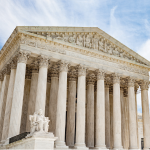(Reuters)—A majority of Americans say Congress should make sure Obamacare subsidies to buy health insurance are available nationwide if the Supreme Court rules that the payments in at least 34 states are illegal, according to a poll released on Tuesday.
The Kaiser Family Foundation poll surveyed 1,200 people from June 2 to June 9 in both English and Spanish.
The Supreme Court is expected to rule this month whether subsidies provided to states that rely on the federal government’s HealthCare.gov insurance exchange are legal based on the requirements of President Barack Obama’s healthcare law. Another 13 states and the District of Columbia operate their own exchanges for residents.
The law, known as the Affordable Care Act, is one of the most politically divisive in the United States in decades. Republicans have repeatedly sought its elimination, with efforts to repeal the law in Congress and multiple legal challenges.
The Obama administration has said it would not have the authority to reinstate the subsidies now used by 6.4 million people if the Supreme Court rules against them in the King v. Burwell case, and that Congress would have to act.
About 63 percent of people surveyed by Kaiser said Congress should pass a law to ensure subsidies are available in all states. By political affiliation, 80 percent of Democrats said Congress should act, versus 38 percent of Republicans.
Bianca DiJulio, an author of the poll, noted that most participants were not aware of the Supreme Court case, with 44 percent of people saying they had heard nothing about it at all.
“It will be interesting to see when the decision is announced whether Americans pay more attention and what they think should happen … when it’s a real-life situation,” DiJulio said.
Among residents who live in states that could be affected, more than half—55 percent—believe that their state should set up its own health insurance marketplace in the event the Supreme Court rules against federal subsidies.
Obamacare took full effect in 2014. The general attitude toward the law remains closely divided, with 42 percent of people surveyed saying they have an unfavorable view versus 39 percent who have a favorable view.
The poll had a margin of error of plus or minus 3 percent.
